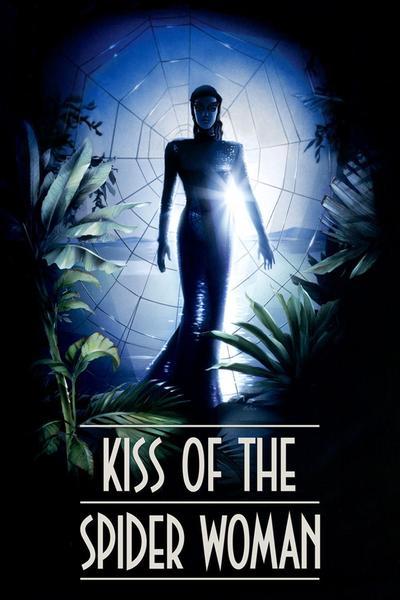![]()
![29f7c043f76a2bde437fd0d52a185152]()
Quote:
Kiss Of The Spider Woman takes place in an un-named, fascist country in South America. It is, essentially, a two-actor drama featuring two men, of vastly different demeanors and ideologies, who share the same cell in a brutal prison. Louis Molina (William Hurt) is a flamboyant homosexual window dresser who is imprisoned for corrupting a minor. His cellmate is Valentin Arregui (Raul Julia), a journalist jailed for his leftist political activities. To alleviate the day-to-day drudgery, Molina entertains Valentin by retelling the stories of his favorite movies.
Kiss Of The Spider Woman is quite possibly the most unusual buddy movie ever made. It is an exceptional character drama of two men who would have little use for each other if they met on the street but, locked together in a prison cell, their relationship deepens – despite their differences – from mutual distrust to understanding and respect. It is a brilliant study of worlds in collision. The black and white codes of straight vs. gay, masculine vs. feminine, reality vs. fantasy, and power vs. submission erode until nothing is left but myriad shades of gray.
The film begins, not unlike Un Chant d’Amour (Jean Genet’s classic, homoerotic, 1950 prison short), with the camera fixed on the wall of their jailhouse cell. We hear Molina’s voice, rapturously describing the star of his movie. “She’s not a woman like all the others,” he utters, along with the assertion that she is waiting for a “real man” like none she has ever met before. A circular camera pan slowly reveals the setting; we see the prison bars, a clothesline with feminine garments, pictures of glamorous movie stars on the wall, and finally Molina – wrapping a towel around his head to suggest a turban. He is dressed in a kimono, his feet, lady-like, step gracefully across the floor as he mimes the heroine stepping into her bath. Molina is exotic and sensual, and completely out of place in the grim prison setting.
His cellmate, Valentin, is masculinity personified. He is rugged, his face is bearded, he shows the scars of his interrogations. He is obsessed with revolution; he might as well be Che Guevara. A man like Valentin would find a man like Molina to be ineffectual and ridiculous, but he listens to his cellmate’s movie to pass the time. It soon becomes apparent to Valentin that the romantic melodrama Molina describes is, in fact, an old Nazi propaganda film. But Molina isn’t concerned with the movie’s politics; all he sees are two dazzling and beautiful people in love on a big screen. “I embroider a little,” Molina croons, “So you can see the movie like I do.” He responds to Valentin’s taunts that “fantasy is no escape” by saying “If you’ve got the keys to that door, I will gladly follow. Otherwise, I will escape in my own way.” Valentin snaps back, “Then your life is as trivial as your movies.”
Molina’s descriptions of the movie are accompanied by lushly filmed, sepia toned images that stand out in contrast against the gray prison photography. This film within a film is beautifully realized kitsch. Everything about it is a cliche-fest from the plot to the deliberately hammy acting; but substance be damned, everything about it is fabulous. We are seeing this “trivial” film through Molina’s eyes as he fulfills the role that many gay men played throughout history; identifying with the glamorous leading lady, the downtrodden female.
Molina will test Valentin’s patience but he will also break through the Leftist’s armor. As they grow closer, Valentin is able to see that Molina, a homosexual, is another oppressed victim of Big Brother’s regime. They find common ground because both are enemies of the state, even if for very different reasons. Still, when angered, he calls Molina a faggot, tells him to “be a man,” and then finds his pre-conceived notions of masculinity challenged again and again. Molina undergoes his own transformation when he is forced to look below the surface as Valentin violently reminds him that the Nazis who made his romanticized film also shoved Jews, Marxists and homosexuals into the ovens. But spinning the movie’s tale benefits both of them as each is a Romantic in his own way; for Molina it’s a silver screen goddess, for Valentin it’s the idea of revolution.
Valentin finds that he’s not immune to fantasy’s lure. He will admit to Molina that, when he was being tortured, the only thing that saved him was thinking about Marta. The idealized Marta is a good example of the layers and the depth that original novelist Manuel Puig gave to his characters. The one woman that this child of the revolution loved was “upper class, pure Bourgeois,” and he feels like a hypocrite because of it. We will see her in flashback, she is played by Sonia Braga. The same actress also plays the heroine in the Nazi film and the Spider Woman in Molina’s final tale – blurring further the line between fantasy and reality.
The lines between masculine and feminine are blurred as well. Look at their names; which of the two sounds more like a woman’s name? The questions of what makes a man weave throughout the film. “I take it like a woman. Always.” Molina tells Valentin; he wants a “real man” to take control. Valentin, who believes in the equality of women, cannot accept this and he tells Molina that “what really makes a man has to do with not humiliating anybody. It’s not letting the people around you feel degraded.” Molina embraces his role as a woman, and as a victim, while Valentin angrily asks “What’s this between your legs?” But, at times, Molina proves stronger than his revolutionary comrade. It is Valentin who, after being poisoned by the prison food, cries when he soils himself. He feels humiliation, and then gratitude, as Molina cleans him up. This is a love story like no other and it is, at its core, a love story.
Kiss Of The Spider Woman is an amazing film. Gritty and realistic, some of the prison scenes are the stuff of nightmares. Director Hector Babenco had previously filmed 1981’s Pixote, a dark story about street kids. The cinematography deftly exploits the claustrophobic confinement in the geography of their cell. The contrast of the prison and the old movie clips is one of the ways in which the film remains visually arresting throughout. Hurt and Julia have a marvelous chemistry as Molina and Valentin; their scenes together on screen are pure magic. Some have called Hurt’s acting over-the-top but I disagree. (Puig said that Hurt was so bad that he would probably win an Oscar.) His humanity is always there beneath the artifice and his performance is heartbreaking. The late Raul Julia is also unforgettable as Valentin.
The film version is, in many ways, more accessible than the original novel. The film is more tightly constructed because Molina tells the stories of several different movies in the book, beginning with Val Lewton’s classic 1942 Cat People. Only one of these films was emphasized in the movie and that was the Nazi film, whose central theme of betrayal mirrors Molina and Valentin’s situation, making Spider Woman a model of effective film adaptation. To be honest, it’s easy to lose interest in Molina’s long monologues when reading the book; in the film his monologues come to life when illustrated by those campy clips.
Vito Russo was very critical of Kiss Of The Spider Woman in The Celluloid Closet and so were many other queer reviewers. Most of their criticisms however aren’t valid unless, like them, you refuse to see the film as anything but just another portrayal of a stereotypical screaming queen who dies in the last reel. Yes, Molina does die at the end, in much the same way as the heroine of the Nazi film, but it is all too probable that he won’t be alone and that Valentin will share the same fate. For that reason, it’s unfair to lump Spider Woman in the same category as an overblown, homophobic melodrama like Reflections In A Golden Eye. Besides, don’t most of Shakespeare’s leading men bite the dust in the last act too? I see no possible way for this film to end happily, and so let us instead examine the transformation that happens between the two men, Valentin’s opinion of Molina changes drastically. He is no longer a silly faggot in his eyes but a man whose sense of dignity is equal to his own. Valentin will even make love to Molina, his notions of what traditionally defines a man shattered forever. It is possible that his only reason for doing this was to convince Molina to take a message to the Resistance, but it is also apparent that his newfound respect, and even his love, for his cellmate is genuine. “Promise me,” Valentin ultimately says, “You won’t let anyone exploit you again. No one has the right to do that to anyone.” Molina’s motives are far more complicated than first thought when we discover, at the film’s mid-point, that he is actually spying on Valentin in exchange for an early parole. This revelation pulls the rug out from under the audience but, like Molina’s beloved screen heroine, he essentially becomes a double agent. Molina has fallen in love with his cellmate; he gives no information to his captors. He agrees to help Valentin on the outside and his sudden political involvement proves fatal. If John Wayne were watching the film, he would probably subscribe to the quaint idea that this sacrifice finally makes Molina a “man.”
If that is the case, what of Valentin? He learns that it isn’t wrong, or weak, to embrace what he once rejected as trivial. At the end, the revolutionary is the infirmary after having been beaten and almost tortured to death. After an orderly risks his job by giving him morphine, Valentin remembers Molina’s lessons and he escapes into fantasy. Marta appears and they run out of the prison, hand in hand, until they are together – in glimmering black and white – on the Spider Woman’s island and the film ends much like Un Chant d’Amour did, with an escape from brutal reality into daydreams.
Kiss Of The Spider Woman was a radical, almost subversive, film on its first release as it explored concepts of gender roles and the question of what it ultimately means to be a man during a time when Rambo was the established norm of hyper-masculinity on the silver screen. Ponder too what it was like to watch two men kiss – not a common sight in a mainstream film during the 1980s. Kiss Of The Spider Woman broke much new ground and it still holds up today as one queer cinema’s milestones.
![]()
http://nitroflare.com/view/45E6E7F59EC0CFD/Kiss.of.the.Spider.Woman.%281985%29.AC3.XVID.DVDRIP.avi
http://nitroflare.com/view/497CADFB7ADEB66/Kiss.of.the.Spider.Woman.%281985%29.AC3.XVID.DVDRIP.idx
http://nitroflare.com/view/E0B1D933A394F46/Kiss.of.the.Spider.Woman.%281985%29.AC3.XVID.DVDRIP.srt
http://nitroflare.com/view/923A6563C5CD5F4/Kiss.of.the.Spider.Woman.%281985%29.AC3.XVID.DVDRIP.sub
http://nitroflare.com/view/4978A827F0AA44A/trailer.avi
Language(s):English
Subtitles:english, spanish srt, sub+idx




























































































































































